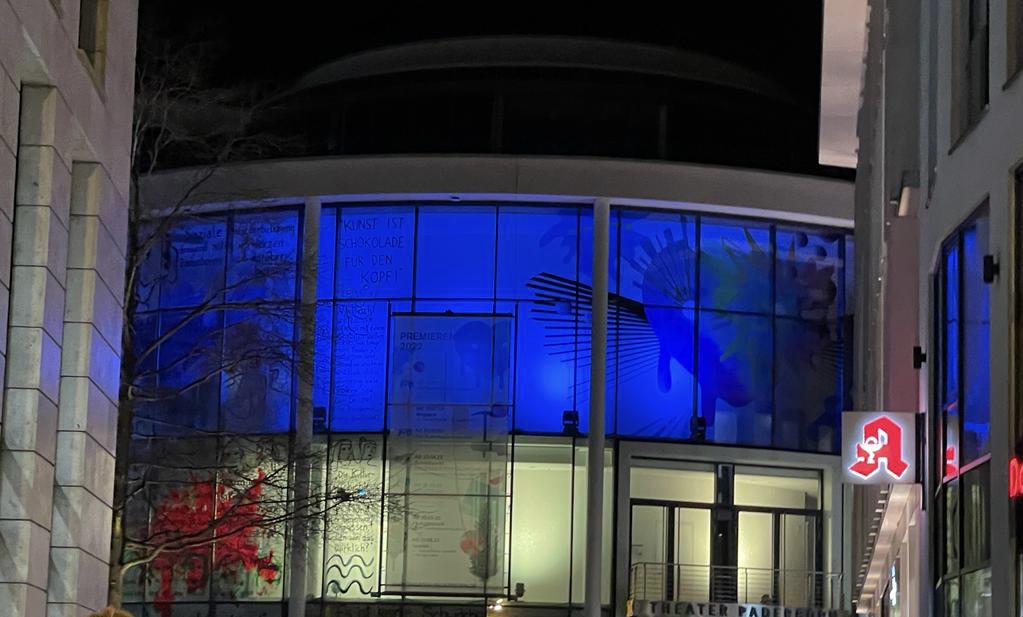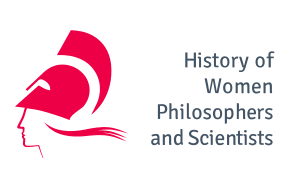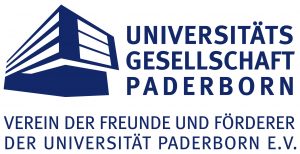Voices from Ukraine: History of Women Philosophers and Scientists in the Situation of War
A cooperation between Kateryna Karpenko, Director of the Center for Gender Studies, Kharkiv National Medical University, and Ruth Edith Hagengruber, Director of the Center for the History of Women Philosophers and Scientists
When? May 27th – May 28th 2022
Where? Zoom
What? Hybrid Conference
Almost three months have passed since Russia launched a full-scale war against Ukraine, bringing death, suffering, destruction and radically changing the established way of life. Many people have moved to quieter areas of Ukraine, many have found temporary shelter abroad. The shock of the first days of the war is being replaced by the need to comprehend the current situation in various contexts, including articulating the issues of gender parity in scientific ethos in a new way.
The purpose of the conference “Voices from Ukraine: History of Women Philosophers and Scientists in the Situation of War”, on the one hand, is to support and continue scientific cooperation with the Center for Gender Education of Kharkiv National Medical University, and on the other hand, to create a scientific platform for the exchange of thoughts on the life trajectories of women scientists in war and their prospects.
An important topic of discussion will be the position of women researchers in the social sciences and humanities, where the proportion of women exceeds 60%. Low wages, involuntary part-time work, short-term contracts, self-financing of research—all these characteristics of the position of scientists and researchers can be interpreted as markers of an unsustainable situation, which is undoubtedly exacerbated by war.
Many Ukrainian women scientists came to Germany after the start of a full-scale war in Ukraine on guest invitations from local universities and foundations. The conference will discuss the problems of integration into German academic life and the continuation of an academic career.
An important topic of discussion will be the existential dimensions of war and peace in the context of the search for meaning in life and self-realization of women. Ecofeminism and the ethics of care will become the methodological basis for analyzing the environmental consequences of war.
Language:
Talks / Presentations in English
Discussions in English, German and Ukrainian
Ukrainian-German Interpreter (Prof. Dr. Volodymyr Abashnik) will be present via Zoom
Speakers:
Prof. Dr. Olena Strelnyk; Visiting Scholar, Technial University of Munich, Germany
Prof. Dr. Tatiana Perga; Senior Researcher of the State Institution ‘Institute of World History of National Academy of Science of Ukraine’, DAAD fellow at Heidelberg University
Prof. Dr. Nellya Filyanina; Department of Philosophy at Kharkiv National Medical University, Ukraine
As. Prof. Dr. Nataliya Kufterina; National Technical University “Kharkiv Polytechnic Institute”
Prof. Dr. Iryna Utiuzh; Department of Social Sciences, Zaporizhzhia State Medical University
Prof. Dr. Volodymyr Abashnik; Department of Philosophy at Kharkiv National Medical University, Ukraine
Olena V. Zaytseva; post-graduate student at VM Koretsky Institute of State and Law of National Academy of Sciences of Ukraine
Prof. Dr. Kateryna Karpenko; Head of Department of Philosophy and Director of the Center for Gender Studies at Kharkiv National Medical University, Ukraine
Registration: For registration, send an e-mail to srebekka@campus.uni-paderborn.de
Prof. Dr. Volodymyr Abashnik
Department of Philosophy at Kharkiv National Medical University, Ukraine
Volodymyr Abaschnik (geb. 1967), Prof. Dr. phil. habil.
Studium der Germanistik und der Philosophie an der Staatlichen Universität Charkiw (Ukraine), Promotion an der Friedrich-Schiller-Universität Jena (2002) zu Kant und dem Deutschen Idealismus in der Ukraine, Habilitation zur Universitätsphilosophie in Charkiw (2015). Seit 2003 bis 2021 Inhaber des Lehrstuhls für Geisteswissenschaften an der Charkiwer Universität für Wirtschaft und Recht. Seit 2017 Philosophieprofessor an der V.N. Karazin-Nationaluniversität Charkiw. Seit September 2021 bis jetzt Professor im Lehrstuhl für Philosophie an der Kharkiv National Medical University (Ukraine).
Forschungsaufenthalte an der LMU München und der Universität Bremen (Alexander von Humboldt-Stipendiat), dem MPIER in Frankfurt am Main, Hans-Kelsen-Institut Wien, in Wolfenbüttel, in den Franckeschen Stiftungen zu Halle u.a. Ca. 180 Vorträge bei verschiedenen internationalen Tagungen und Kongressen. Ca. 245 Publikationen zu Kant, Fichte, Schelling, Leibniz, zur Rechtsphilosophie (u.a. Hans Kelsen), zu den deutsch-ukrainischen wissenschaftlichen Beziehungen u.a.
Johanna Charlotte Unzer (1725–1782): Philosophin und Aufklärerin in der Zeit des Siebenjährigen Krieges – Abstract
(Johanna Charlotte Unzer (1725–1782): Woman Philosopher and Enlightener during the Seven Years’ War)
Im Mittelpunkt dieses Themas steht das Werk einer wichtigen Philosophin und Dichterin der Aufklärungszeit in Deutschland. Zuerst wird auf die Grundzüge des Lebenswegs und des Lebenswerks von Johanna Charlotte Unzer bzw. Zieglerin (geb. in Halle, gest. in Altona) eingegangen. Dann werden die Hauptideen ihrer Arbeit „Grundriß einer Weltweißheit für das Frauenzimmer“ (2. Aufl., 1767), darunter im Kontext der damaligen Philosophie, kurz berücksichtigt. Anschließend wird der Beitrag dieser Philosophin und Dichterin, die zur Mitgliederin der gelehrten Gesellschaften in Göttingen und Helmstedt gewählt sowie zur „Poeta laureata“ (1753) gekrönt wurde, zur Aufklärung gewürdigt.
Prof. Dr. Nelya Filyanina
Department of Philosophy at Kharkiv National Medical University, Ukraine
Nelya Filyanina is a Doctor of Philosophy Science (specialty 09.00.09). Main directions of scientific research: educational potential of humanitarian knowledge, the role of education in overcoming of ecological and anthropological crises; metaphors in education and environmental education; autobiographical element in all genres and varieties of writers of the XIX – early XX century, standards of humanities education, forms, and methods of quality control of education, content of humanities education. She has more than 120 scientific publications, including two monographs. She participated in the International conferences in Italy, Slovenia, Poland, and others.
Nature and woman: landscape of war – Abstract
The full-scale Russian invasion of Ukraine are forcing the world community to mobilize efforts to find and justify effective strategies for the survival of humanity. The war was and remains a test not only for men and women, but also for wildlife, outside of which the survival of mankind is impossible. To date, the population of the occupied territories has suffered and continues to suffer losses and suffering: destroyed infrastructure (including critical ones), burned houses, mass executions, countless atrocities, and rapes – and all this, if hostilities continue. Therefore, it is too early to talk about the impact of war on our environment, but the consequences are disappointing. During these challenges, women defend Ukraine with a weapon in their hands, developing such a model of social development that meets the new environmental paradigm, as well as the development of women’s rights.
Prof. Dr. Kateryna Karpenko
Head of Department of Philosophy and Director of the Center for Gender Studies at Kharkiv National Medical University, Ukraine
Kateryna Karpenko defended her dissertation “The Gender dimension of the ecological communication” in 2006 at Kharkiv V.N. Karazin National University. She is a Doctor of Philosophy Science (2007), Professor (2008). She is a Head of the Department of Philosophy (2018), Director of the Centre for Gender Education (2012).
Published more than 200 works: monograph “Nature and Woman: Ecofeminist Perspectives in Ukraine” (2006, in Ukrainian). She took part in more than 100 International conferences in Ukraine, Germany, Great Britain, USA, China, Estonia, Hungary, Austria, Holland, Switzerland, Italy, Macedonia. The latest were the XV International Association of Women Philosophers (IAPh) Symposium ‘Philosophy, Knowledge and Feminist Practices’ (2014, Alcala, Spain), 24-th World Philosophy Congress (2018, Beijing, China), XVII International Association of Women Philosophers (IAPh) Symposium ‘Women and Philosophy in the era of globalization’ (2018), 10th Biennial conference of the European Society for Environmental History (ESEH) ‘Boundaries in/of Environmental’, Tallinn, Estonia (2019), XVIII International Association of Women Philosophers (IAPh) Symposium ‘Defining the Future, Rethinking the Past’ (Paderborn, Germany, 2021).
She initiated and coordinated the International Interdisciplinary Conference “Gender. Ecology. Health” (2007, 2008, 2011, 2015, 2017, 2019, 2021).
Ecofeminism and the ethics of care as the methodological basis for analyzing the environmental consequences of war – Abstract
In my presentation, I turn to the basic ideas of Wittgensteinian ecofeminism and the ethics of care, which allow us to reflect the problem of the impact of war on the natural environment in the context of the subjects, objects and means of this ambiguous process. I will talk about women authors who raise the issue of the consequences of military action on nature, about women who are identified with nature as an “inexhaustible” source of reproduction of manpower, about women in war as a metaphor for ideological manipulations. I will try to give one of the possible answers to the question of how we can create a more humane environment.
Prof. Dr. Nataliya Kufterina
National Technical University “Kharkiv Polytechnic Institute”, Ukraine
Nataliya Kufterina Medical director (Dr., PhD, Associate Professor) Proactive, patient-orientated administration professional with 4 years of public service in leadership positions and administrative activities, 10 years of experience in medical (farmaceutical) business cooperation, teaching, scientific and medical practice.
Woman in science and public administration in the context of the war in Ukraine – Abstract
From February 2022 to the present, Ukraine and its people have been constantly suffering from Russian aggression. Critical infrastructure, homes and families are destroyed daily, human life is mutilated. Due to the tragic circumstances caused by Russian aggression, the state administration system is changing dramatically, Ukrainian scientists and the development of Ukrainian science have a devastating impact: universities and research institutes are being destroyed, people are forced to spend all their time in bomb shelters and even leave the country, etc. The report is devoted to the analysis of the situation that has developed because of the war in science and public administration and the search for ways to solve the problems that women face in science and public administration.
Prof. Dr. Tatiana Perga
Senior Researcher of the State Institution ‘Institute of World History of National Academy of Science of Ukraine’, DAAD fellow at Heidelberg University
Tetiana Perga has a PhD in History from the Kyiv State University named Taras Shevchenko, Kyiv, Ukraine. Since 1993, she has been working in the National Academy of Science of Ukraine: in 1993-2013 – in the Institute of World Economy and International Relations, from 2014 till now – in the Institute of World History. At the moment, she is the leading researcher. She is an author of 140 articles, co-author of 7 books, and author of 2 individual books that focused on different aspects of environmental history. She is a DAAD fellow in IOS Regensburg (June-July 2018), a Head of the Ukrainian Representative office of ESEH, member of Leo Baeck Institute Jerusalem Research Group in Jewish European Environmental History, a Head of the Ukrainian representative office of ESEH. At the moment she is DAAD fellow in Heidelberg University.
Perspectives of environmental history research in the context of war of Russia against Ukraine – Abstract
The report will examine the impact of Russia’s war against Ukraine on the environment and infrastructure of Ukraine and the European region. The accent will be paid to new perspectives and directions of research in the field of environmental history. The author will consider the role of the Ukrainian women scientists as actors in the development of environmental history research. On the one hand, the war is a challenge to Ukrainian researchers, and on the other hand, it opens new opportunities for them. Due to the temporary migration of many Ukrainian woman researchers to the countries of the European Union, they get the possibility to present the achievements of the Ukrainian science in many fields, including environmental history, share ideas, exchange opinions with European woman researchers and investigate their research. This creates the basis for the integration of Ukrainian women scientists into the European network of women scientists and strengthens research in the field of environmental history.
Prof. Dr. Olena Strelnyk
Visiting Scholar, Technial University of Munich, Germany
Olena Strelnyk obtained her Dr. Habilit. Degree in Sociology in 2018 at Taras Shevchenko Kyiv National University, Ukraine. She is the author of “Childcare as work. A sociological perspective on mothering” (2017). The fields of her expertise are gender issues, family, parenthood, and care work. She was a visiting scholar at the Institute for Research on Women and Gender, University of Michigan (in the frame of Carnegie Research Fellowship Program, 2016), and at Prague Civil Society Centre (2019).
Her recent research and expert work in Ukraine focused on the situation of women form national minorities (OSCE, 2021), the impact of Covid-19 on situation and needs of women (UN Women, 2020), preschool childcare system in Ukraine (Rosa Luxemburg Stiftung, 2020). Since April 2022, Olena has been a Visiting Scholar within the program to support Ukrainian scholars of the Technical University of Munich.
Displaced women-scholars: from the old precarious position to the new one? – Abstract
I will focus my presentation about women researchers in the social sciences and humanities, where share of women in these fields exceeds 60%. Low salaries forced part-time employment, short-term contracts, self-funded research, all these characteristics of the situation of scientists and researchers can be interpreted as markers of precarious position. Many Ukrainian women scientists and scholars came to Germany after the start of a full-scale war in Ukraine at the hospitable invitation of local universities and foundations. Soon or later, many women will face the challenge of integrating into German academic life and pursuing academic careers in a different context and with mostly lower starting positions in comparison with colleagues from Western academic community. If institutional mechanisms to support displaced women fail to be established, women run the risk of finding themselves in a new precarious position.
Prof. Dr. Iryna Utiuzh
Department of Social Sciences, Zaporizhzhia State Medical University
In 2013 Iryna Utiuzh defended her doctoral dissertation “Modern educational paradigms: socio-philosophical context” at Taras Shevchenko’s National University of Kyiv. Professor (2014). She has 210 scientific works, 4 of which are in the scientific and metric databases of Scopus and Web of Science. Participates in scientific conferences of international and All-Ukrainian level, as well as in international research projects.
Existential dimensions of war – Abstract
My report will be dedicated to existential dimensions of war. For all of Ukraine, the current situation has become hyper extreme. The internal burdens it causes often exceed human capabilities, destroy normal behavior and actions, and lead to dangerous consequences. And in this difficult situation, we must clearly understand the meaning of our lives. Try to get rid of the existential vacuum and form a tolerance for uncertainty. And only a woman is capable of such existential optimism, in conditions of war, which shapes and supports human life itself.
Olena V. Zaytseva
V.M. Koretsky Institute of State and Law of National Academy of Sciences of Ukraine
Olena Zaitseva is a lawyer and researcher of international law on combating sexual exploitation. Olena has a Master’s degree in International Law and has worked in international commercial law and due diligence for more than 10 years. Since 2015, her professional focus had been women’s rights. Olena is the author of numerous legal articles, including the topic of gender based violence, gender equality, Nordic (Equality) Model. Olena is cooperating with the UN Women, and is a gender equality expert in SURGe, The Support to Ukraine’s Reforms for Governance Project, related to strategic planning and integrations of the Canadian GBA+ approach. She is also a Canadian Development Program Gender Equality Consultant for Ukraine. On February 24th, Olena joined a team in SURGe on combating trafficking in human beings and gender-based violence. Olena is a post-graduate student of VM Koretsky Institute of State and Law of National Academy of Sciences of Ukraine.
The impact of traditional values and realities of modern war on Ukrainian women: risks and perspectives – Abstract
The Ukrainian army and defenders of Ukraine are not only men, although this is the impression of most official speeches and discussions in society. Women had to adapt to the situation that has been developing in Ukraine since 2014, to defend the country with weapons in hand, to rethink their role in society. At the same time, traditional stereotypes do not change so quickly and any choice of a woman can lead to accusations: if she went to the army she is “not a real mother”, if she chose to take children abroad she is a fugitive or even a traitor. When women go abroad, they became vulnerable to situations of trafficking, as prostitution is unfortunately legalized in some European countries. If women turn to the military enlistment office in Ukraine, they are ridiculed; if they are given the opportunity to serve in the army, they are given stereotypical “female” tasks (cooking, cleaning), and commanders allow jokes and objectification about them. This situation is typical of patriarchal culture, which is built on the devaluation of the role of women in society, the perception of women as an object, not a subject. This culture is so deeply embedded at the level of the state and society that we often do not notice its manifestations around us and in ourselves. Our task is to learn to see these manifestations, only then will we be able to resist them.
You cannot copy content of this page













